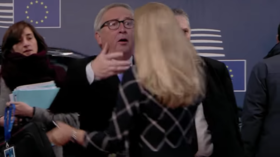'Winter is coming’: Subservience to bankers & failure to reform is leading us into another crash

It is obscene that governments are failing to make changes needed to avoid another global financial crash despite many economists warning that one is coming, writes Ken Livingstone.
Back in October, the International Monetary Fund and World Bank had their annual meeting in Indonesia, where Indonesian President Widodo told the plenary session: “With all the problems that the global economy currently faces, it’s appropriate to say that winter is coming.”
He was followed by the head of the IMF, Christine Lagarde, who pointed out that global debt (public and private) had increased by sixty percent since 2007 and now equalled $182 trillion. Whilst almost no one predicted the financial crash of 2008 there is widespread debate about another crash perhaps even worse. About once a decade a financial crisis occurs and since 2008 central banks have encouraged a big increase in share prices and property value by cutting interest rates and generating vast amounts of new money called quantitative easing.
Edward Bonham Carter, vice chair of Jupiter Asset Management, warned: “The party is coming to an end. Remove the crutches that have supported global growth for a decade, throw in a trade war between the two largest economies, add a dash of wage inflation and a side dish of Brexit and you have a recipe that may prove rather unpalatable to global markets in 2019.”
Also on rt.com Global debt hits all-time high of $184,000,000,000,000In the US, Google, Microsoft, Netflix, Facebook, Apple and Amazon have cornered two thirds of the global stock market returns so far this year. In no way is that sustainable.
China’s economy has begun to slow and Europe’s biggest economy, Germany, has gone into reverse. After the boost to the US economy when President Trump slashed taxes for the rich, economic growth in the US is expected to slow down next year to 1.9 percent next year.
Americans are nervous which means they are buying less and saving more. This has led the IMF to warn of the negative impact of the US economy on the rest of the world.
The simple fact is that you do not sustain economic recovery based on increasing levels of debt. We are now back to the same volatile situation we were before the 2008 crisis. Governments around the world have failed to reform the system with President Obama doing nothing to change America’s dodgy markets through his eight years in office.
Former UK Labour Prime Minister Gordon Brown warned that the world economy was “sleepwalking into a future crisis” and the risks we face were being ignored by “a leaderless world.” The IMF said: “Large challenges loom for the global economy to prevent a second great depression,” and pointed out that, although global debt was way above 2008 levels, it had not led to increased levels of investment in infrastructure, research and development.
It is not just economists who are worried about the future. The growing pressure on ordinary workers in the US has seen life expectancy declining in each year since 2014.
But instead of tackling the domestic crisis President Trump unleashed an economic war by imposing tariffs on Chinese exports to the US. Although China has become the world’s second largest economy, the stock market in China has fallen and industry and retail sales have slowed.
Over the last three months the economies of Germany, France and Japan have contracted. The chief of the European Central Bank, Mario Draghi, warned that growth will not reach the expected level in 2019 and 2020 blaming “the uncertainty”. Fortunately Trump has now put his trade war on hold for ninety days, but that doesn’t tackle the problem of the weakness of the global economy which affects virtually all nations.
David Lipton, First Deputy Managing Director of the IMF, has warned that “Crisis prevention is incomplete,” more than a decade since the 2008 crash. He went on to say: “As we have put it, fix the roof while the sun shines, but like many of you, I see storm clouds building.” He pointed out that nation states lack the firepower to combat the next recession and called on governments to work together and try to prevent another crash.
Following the 2008 crash many of us assumed governments would introduce economic reform to prevent this happening again and the biggest factor in that would have been to regulate the financial markets. After the Wall Street crash of 1929, the incoming president, Roosevelt, rapidly signed into law the Glass-Steagall law, which made it illegal for high street banks to take risks with dodgy dealings. This created over sixty years of financial stability until the law was repealed by President Clinton in 1998 which opened the way to the crash a decade later.
The demand for reform faded away as the global economy stabilised. Banks lobbied against the introduction of new regulations and politicians started talking about the need for austerity as the way of sorting out the crisis.
Here in Britain our economy has hit the lowest levels of growth in my lifetime. Our trade deficit has surged by over £3 billion in the three months up to October. Our investment is at its lowest level since the global financial crisis and productivity growth barely exists. One economic study by BIS (Bank for International Settlements) of fourteen advanced countries warns that 12 percent of their firms were in a zombie-state, unlike just two percent thirty years ago.
READ MORE: Former Fed chair warns of ‘gigantic holes in the system’ & new financial meltdown risk
Politicians continue to live in denial with Britain’s Chancellor, Philip Hammond, claiming our economy has been picking up speed even though business investment fell by 1.2 percent.
Britain’s problem has been that governments consistently keep our taxes lower than the rest of Europe which means we lack the money to invest in creating new jobs in the public sector. Our banking system grew from five to fifteen percent of our economy between 1970 and 2007 but the impact on manufacturing saw a slump from thirty-two percent to just twelve percent.
Our economy is now predicted to grow to just 1.2 percent over the coming years and even Germany is only looking at an increase of 1.8 percent next year.
Politicians’ subservience to the bankers has had a dreadful impact on our life, with the number of rough sleepers increasing from 10,000 to 24,000 in the last eight years in the UK, with wages down by a third in some parts. Former Prime Minister Brown said: “It makes me angry. I am seeing poverty I didn’t think I would ever see again in my lifetime.”
Clearly, the prospect of Brexit has made things worse in Britain with the Royal Bank of Scotland planning to move a third of its investment banking clients and £6 billion of assets from the UK to Amsterdam. Only 3.5 percent of business lending by UK banks went into our manufacturing whilst 60 percent went to financial intermediaries like private equity funds.
We have had forty years in which prime ministers from Thatcher to Theresa May believe that the City of London is the goose that lays the golden eggs and needs to be pampered and protected. Corporations have paid £16 billion less since corporation tax was cut, from twenty-eight to twenty percent by David Cameron’s government, but as the figures show this has not led to any increase in investment.
Privatisation has been another big factor in our decline as private financial initiatives are just a gift to the banking system.
Back in August 2005, the IMF’s chief economist, Raghuram Rajan, warned about the possibility of a financial crash but was largely ignored. The Clinton administration dismissed him as a Luddite. With so many economists warning about another crash, it is obscene that governments are failing to make the changes we need to avoid this. In the runup to the 2008 US president election American economist Alan Greenspan was asked whether he was supporting McCain or Obama, he said “Thanks to globalisation, policy decisions in the US have been largely replaced by global market forces… It hardly makes any difference who will be the next president.”
Across the world we now have to restore real power to our governments to manage the international banking system and prevent us being ripped off. After 2008, the British government created hundreds of billions of pounds to prop up the banking system equivalent to £19,207 per person in Britain but at the same time ordinary people saw their standard of living being squeezed. Not surprisingly, Britain’s bankers provided half the money for the Tories’ 2010 election campaign and one in four Tory MPs came from the financial sector. So don’t be surprised if this government has done nothing to reform our financial system. I fear that this is largely the case around the world which is why we are heading for another great crash.
Like this story? Share it with a friend!
Subscribe to RT newsletter to get stories the mainstream media won’t tell you.
The statements, views and opinions expressed in this column are solely those of the author and do not necessarily represent those of RT.
















